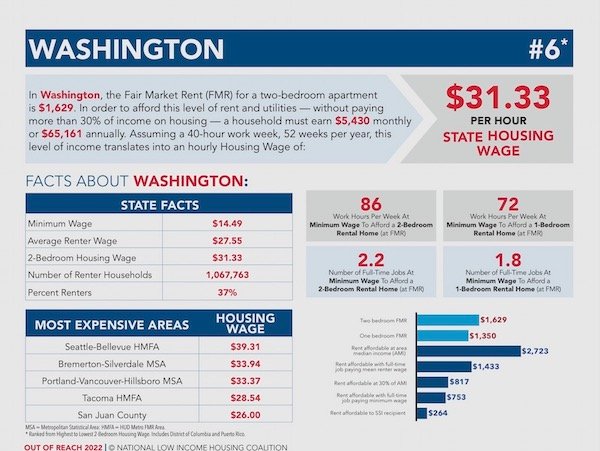
What is a livable salary in Washington state?
Are you curious about the financial landscape in Washington state? Wondering what it takes to achieve a livable salary in the area? Look no further. In this article, we will explore the concept of a livable salary and examine the factors that contribute to determining one in Washington state. From the cost of living to the average wages, we will provide you with a comprehensive overview to help you navigate the ins and outs of establishing a comfortable income in this region. So, whether you’re a current resident or considering a move to Washington state, we’ve got you covered. Let’s delve into the world of livable salaries in Washington state and discover what it truly takes to thrive in this beautiful corner of the Pacific Northwest.
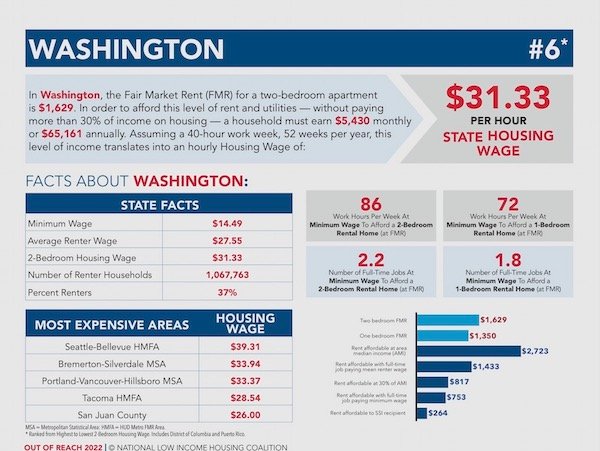
This image is property of www.wliha.org.
Table of Contents
ToggleEconomic Overview of Washington State
Growth of Washington State
Washington State has experienced strong economic growth in recent years, making it an attractive place to live and work. With its vibrant technology industry, thriving agricultural sector, and diverse array of businesses, the state has seen a steady increase in employment opportunities and GDP. The tech giants based in Seattle, such as Amazon and Microsoft, have not only contributed to job creation but also stimulated the growth of related industries, such as software development and data analytics. Additionally, the state’s focus on renewable energy and sustainability has further bolstered its economic growth and attracted investment in clean technology.
Cost of Living in Washington State
While Washington State offers great economic opportunities, it is important to consider the cost of living when assessing the overall livability. The cost of living in Washington State varies depending on the city or region. Larger cities like Seattle have a higher cost of living, primarily due to housing expenses. Other factors that contribute to the cost of living include transportation, food, healthcare, childcare, education, debt payments, savings, and recreational activities. It is crucial to analyze all these aspects to determine a livable salary in Washington State.
Factors Affecting Livability in Washington State
Several factors affect the overall livability in Washington State. These include the state’s minimum wage, income disparities, government legislation and policies, government assistance programs, affordable housing initiatives, public opinion, and challenges faced in achieving a livable salary. Understanding these factors is essential to gain a comprehensive perspective on what constitutes a livable salary in Washington State.
Determining the Livable Salary
Basic Living Expenses
To determine a livable salary in Washington State, one must consider basic living expenses. These expenses encompass essential needs such as housing, transportation, food, healthcare, childcare, education, debt payments, savings, and recreational activities. Taking into account these expenses is crucial to ensure a decent standard of living and financial stability.
Housing Costs in Washington State
Housing costs are a significant component of the overall cost of living in Washington State. In larger cities like Seattle, housing prices have surged in recent years due to high demand and limited supply. Renting an apartment or owning a home in these areas can be quite expensive. To achieve a livable salary, individuals or families need to allocate a significant portion of their income towards housing costs.
Transportation Costs
Transportation costs are an essential expenditure that contributes to the overall cost of living. In Washington State, these costs can include fuel, insurance, vehicle maintenance, public transportation, and commuting expenses. Depending on where one lives and works, transportation costs can vary significantly. For example, individuals residing in urban centers may rely more heavily on public transportation, while those in rural areas may require a personal vehicle for daily commutes. These costs must be considered when determining a livable salary.
Food and Grocery Costs
Another vital aspect of the cost of living in Washington State is food and grocery expenses. The price of groceries varies depending on factors such as location, dietary preferences, and family size. Residents in Washington State have access to a wide range of food options, including organic and locally sourced products. However, it is important to allocate a sufficient budget for food and groceries to maintain a healthy and balanced diet while considering the overall livable salary.
Healthcare Costs
Healthcare costs are an integral part of the cost of living equation. Washington State has a well-developed healthcare system, with numerous hospitals, clinics, and healthcare providers. However, the cost of medical services and health insurance premiums can be significant. To achieve a livable salary, individuals and families must be able to cover their healthcare expenses, including insurance premiums, regular check-ups, medications, and unforeseen medical emergencies.
Childcare and Education Expenses
For families, childcare and education expenses are crucial considerations when determining a livable salary. Childcare costs can vary based on factors such as location, age of the child, and type of care required. It is important to consider the costs of daycare, preschool, or after-school programs when planning a livable salary. Similarly, education expenses, such as tuition fees, books, and supplies, should be factored in for individuals pursuing higher education or professional development.
Debt and Credit Card Payments
Debt and credit card payments can significantly impact the overall financial stability and livability. Individuals with existing debt or credit card balances need to allocate a portion of their income towards repayment. It is essential to consider interest rates, minimum payment requirements, and any outstanding debts when determining a livable salary in Washington State. Managing debt responsibly ensures long-term financial success.
Savings and Emergency Fund
Building savings and maintaining an emergency fund are crucial for long-term financial security and a thriving lifestyle. A livable salary should allow individuals to save a portion of their income regularly. Savings provide a safety net for unexpected expenses, future financial goals, and retirement planning. An emergency fund is essential to handle unforeseen circumstances such as medical emergencies, job loss, or natural disasters.
Recreational and Entertainment Expenses
While it is important to cover basic living expenses, individuals and families should also allocate a portion of their income towards recreational and entertainment expenses. Leisure activities such as dining out, movies, concerts, vacations, and hobbies contribute to a well-rounded and fulfilling lifestyle. While these costs may vary based on personal preferences, they should be considered when determining a livable salary.
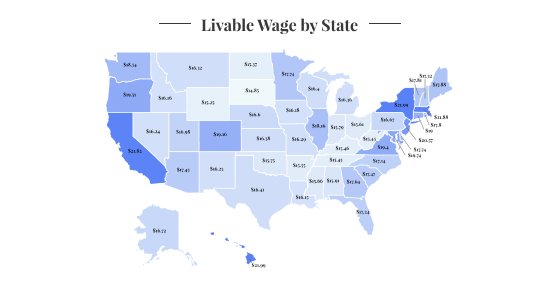
This image is property of wisevoter.com.
Minimum Wage vs. Livable Salary
Current Minimum Wage in Washington State
Washington State has one of the highest minimum wage rates in the country. As of January 2022, the minimum wage stands at $14.49 per hour, significantly higher than the federal minimum wage of $7.25 per hour. This increased minimum wage reflects the state’s commitment to ensuring higher living standards and a fair wage for its residents.
A Comparison with the Livable Salary
While the minimum wage in Washington State is relatively high, it is important to compare it with the actual livable salary. The minimum wage may not provide sufficient income to cover all the essential expenses mentioned earlier. The cost of housing, healthcare, education, and other necessary expenditures can surpass the income earned through minimum wage employment. Therefore, it is vital to determine a livable salary that allows individuals and families to meet their basic needs comfortably.

This image is property of www.ziprecruiter.com.
Income Disparities in Washington State
Income Inequality in Washington State
Despite its economic growth and opportunities, Washington State, like many other states, experiences income inequalities. The gap between the highest and lowest income earners has widened in recent years. The high cost of living, particularly in major cities, can contribute to income disparities. This disparity can impact the livability of individuals and families, as those with lower incomes may struggle to meet basic needs and maintain financial stability.
Effects of Income Disparities on Livability
Income disparities can have significant consequences for the livability of individuals and families in Washington State. Lower-income households may face challenges in accessing affordable housing, quality healthcare, and education opportunities. They may also have limited resources for savings, emergency funds, and recreational activities, affecting overall well-being and quality of life. Addressing income disparities is crucial to ensure a more equitable and livable society for all residents.
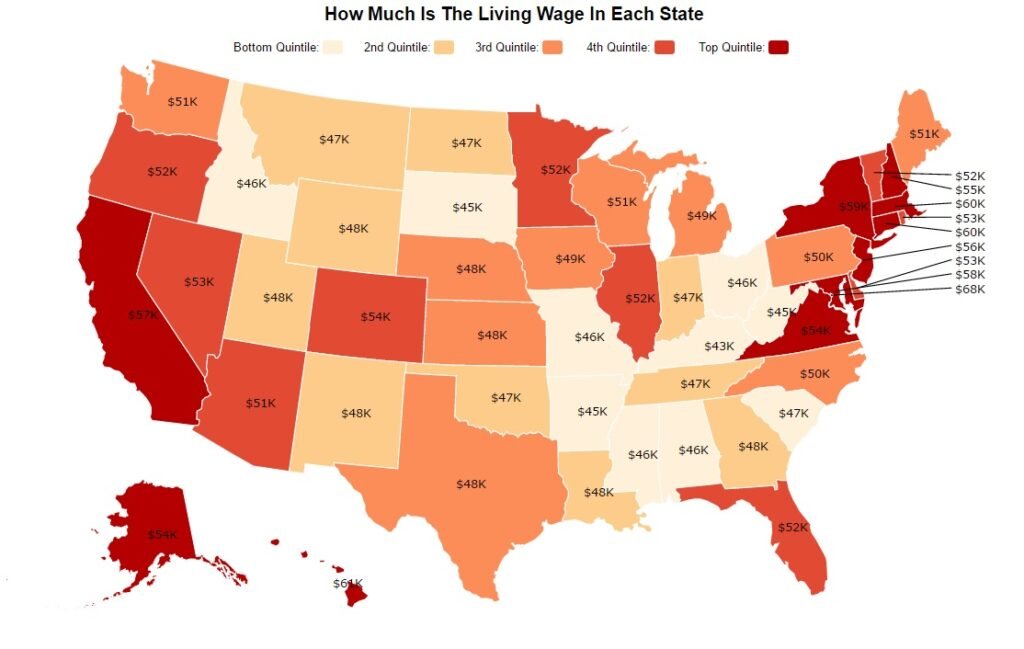
This image is property of research.zippia.com.
Government Actions and Initiatives
Legislation and Policies in Place
To address the challenges associated with a livable salary, the government of Washington State has implemented various legislation and policies. The state’s minimum wage laws, as previously mentioned, aim to provide a fair wage for workers. Additionally, there are laws in place to protect consumer rights, employee benefits, and promote workplace safety. The government’s efforts to regulate and ensure fair business practices contribute to creating a more equitable environment for both workers and employers.
Government Assistance Programs
To support low-income individuals and families, Washington State offers various government assistance programs. These programs provide financial assistance, healthcare coverage, food stamps, and affordable housing options for those in need. By providing these resources, the government aims to bridge the income gap and improve the livability for individuals with limited financial means. Accessing these programs can significantly impact the overall affordability and standard of living for eligible residents.
Affordable Housing Initiatives
Affordable housing is a key concern in Washington State’s efforts to enhance livability. The rising housing costs have strained many residents’ budgets, making it difficult to afford decent and stable accommodation. To address this issue, the state government has initiated affordable housing programs and partnered with non-profit organizations and developers to increase the supply of affordable housing units. These initiatives aim to ensure that housing is accessible and affordable for a wider range of the population, promoting a more livable standard of living for all residents.
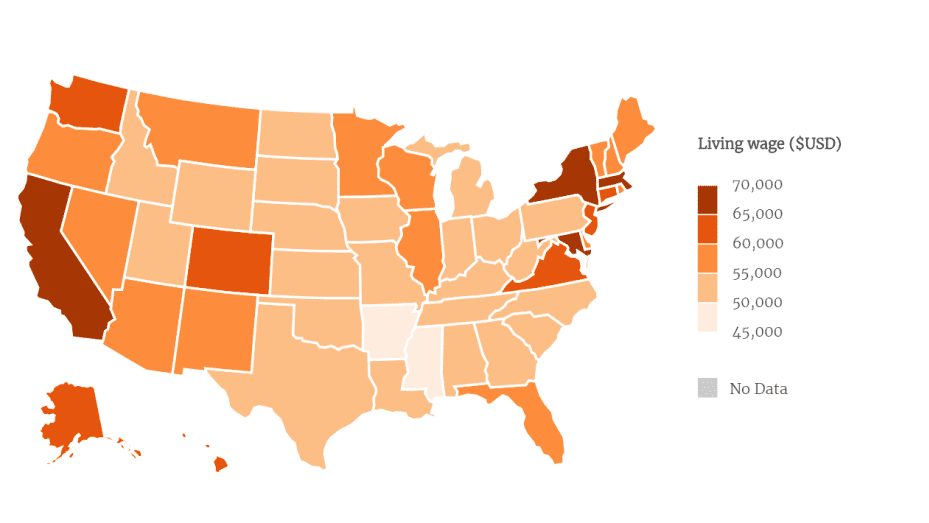
This image is property of image.cnbcfm.com.
Public Opinion and Challenges
Perceptions of a Livable Salary
Public opinion on what constitutes a livable salary in Washington State can vary. Factors such as personal circumstances, individual needs, and aspirations influence how people perceive a livable salary. Some individuals may prioritize the ability to cover basic needs comfortably, while others may consider factors like savings, investments, and discretionary spending. Balancing different expectations and perceptions is essential when discussing what a livable salary entails.
Challenges Faced in Achieving a Livable Salary
Obtaining a livable salary can be a challenge for many individuals and families in Washington State. The high cost of housing, healthcare, education, and other living expenses can strain budgets and hinder financial stability. Income disparities and the increasing wealth gap exacerbate these challenges. Balancing income and expenses, managing debt, and keeping up with rising costs can often feel overwhelming. Overcoming these challenges requires a combination of personal financial management strategies and societal efforts to address systemic issues.
In conclusion, determining a livable salary in Washington State requires an analysis of various factors such as housing costs, transportation expenses, food and grocery expenses, healthcare costs, childcare and education expenses, debt and credit card payments, savings and emergency funds, recreational and entertainment expenses, minimum wage rates, income disparities, government actions and initiatives, and public opinion. By considering these elements comprehensively, individuals and policymakers can work towards creating a more equitable and livable environment for all residents of Washington State.
You May Also Like

How Far is Vancouver Washington from Portland Oregon
3 August 2023
Exploring the Indigenous Heritage of Vancouver Washington
4 September 2023





